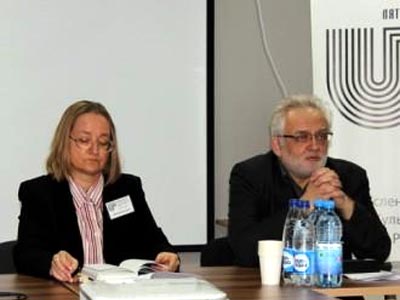The Belarusan National Platform of the EaP CSF issued a statement in connection with the wave of searches in the editorial offices of the Belarusan media and the detention of journalists.
Intellectuals searching for points of contact

In order to discuss the existence and development of something, we have to understand at what stage of development is it situated. But how can we do that?
The problem of defining the starting point of nation, city, university, Belarusan culture has always been topical. Philosophers, historians, political scientists and educators have discussed the problem at the conference “Origin and existence: method of determining and method of action. Ontological, existential, historical and program aspects”. The conference was organized by the Flying University and the International Consortium “EuroBelarus”.
It is difficult to reach consensus on most questions of existence and non-existence. These difficulties start with the problem of self-identification, believes Uladzimir Matskevich, the head of the Board of the International Consortium “EuroBelarus”, philosopher and methodologist. If we want nation, social institutions and family exist in reality and comply with the imagined object, we have to think them over in the ideal plan.
In his speech, Uladzimir Matskevich noted that in order to initiate development co-existence and cooperation should be reached. And for that we need to understand what should the starting point for the object we want to create be.
“Before we start organizing something and putting it into reality, we should do all the work in our imagination. But there is a profound difference between the imagination and realization; in methodology it is referred to as a communicative area. To overcome this difference we should involve in communication those who exist in reality,” Uladzimir Matskevich explained. “In order to avoid eternal dispute and reach consensus in the problem of some object’s existence, we should give more rights to one side of communication.”
“In the beginning was the Word,” recalled Uladzimir Matskevich. “And in continuation is communication.”
The origin forms a system of absolute coordinates for the objects that have already emerged, can emerge and will never emerge, noted Iryna Dubianetskaya, Doctor of Theology and Philosophy. Since earliest times creation and emergence of something has significant meaning.
Tatiana Shchyttsova, EHU philosophy professor, asked the participants of the discussion to distinguish between the two types of new undertaking: protest undertaking, when we are talking about direct disproof of the old; and disconnecting undertaking, where the emergence of new condition presupposes its openness and vulnerability. The last one cannot be reached; it happens with the participants of social cooperation.
In order to discuss the existence and development of something, we have to understand at what stage is it situated. Hot debate starts when philosophers try to sort out the situation and determine whether Belarusan philosophy exists at all.
In order to reach the main aim of the cooperation between the participants of the conference, which is to find points of contact and cooperate in various approaches to the problem of existence and origin, participants worked in sections.
“We brought together intellectuals, who are involved in the making of nation, civil society and university formation,” says Tatiana Vadalazhskaya, coordinator of the Flying University. “These people often wonder how to understand whether the object they work at already exists or not; and if it does, in what form it exists. The answers to such questions are the cause of the everyday actions. Common discussion of problems enables us to move further in a more coordinated and efficient way. Because we do not show our groundwork; we talk, try to understand each other and what lies “behind us”, what unites us in our aspirations.”


Photo by Uladzimir Matskevich
Others
-
Statement of the Belarusan EaP CSF National Platform on solidarity with the civil society of Armenia
The Belarusan National Platform of the Eastern Partnership Civil Society Forum issued a statement on solidarity with the civil society of Armenia.
-
Statement of the BNP in connection with the criminal prosecution of the leaders of the Belarusan independent trade unions
The Belarusan National Platform of the Eastern Partnership Civil Society Forum issued a statement in connection with the criminal prosecution of the leaders of the Belarusan independent trade unions.
-
Final event of project CHOICE — Paving the way to European Year of Cultural Heritage 2018
The final event of the two-year EU funded project CHOICE — Cultural Heritage: Opportunity for Improving Civic Engagement was held on June 6, 2017 at the Committee of the Regions, in Brussels.
-
Heritage is a verb. The results of the CHOICE project were summarized in Minsk (Photos and video)
Does Belarus need a “Public Ministry of Culture” and “Ašmiany Charter” to deal with the historical and cultural sites?








Comments
From farewell to a new Eastern policy and towards a new development
Poland and Germany were both initiators and drivers of a New Eastern policy linked to the Eastern neighborhood and Russia/Soviet Union.